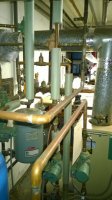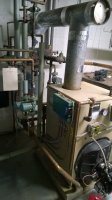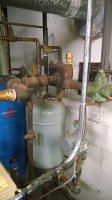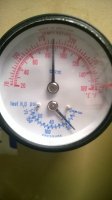forumpersona
New Member
I live in a 2 story/3 zone (one for the basement) 2700 sq.ft. home in CT. We moved in 2 years ago. During the 1st winter we saw that there was some banging in the pipes when heat was called for. Usually one loud bang followed by the baseboard fins pinging.
We had some work done to the house where the main water supply needed to be shut off and pipes drained. Since then, the pipes bang a lot worse. We're talking about multiple bangs more like 5-15 of them in rapid succession as heat is called for. These bangs are all in our bedroom which is the room furthest away from the boiler.
We just had the boiler serviced and everything was ok. We mentioned the banging and the possibility of air in the system to the technician and we were pointed at some automatic vent valve that is supposed to auto-vent the air but I am not convinced. Too much of a coincidence that after we drained and refilled we got so much extra banging.
It is now interfering with our sleep because as it got colder, the heat cycles on and off many times per night. Amy suggestions?
Thx
We had some work done to the house where the main water supply needed to be shut off and pipes drained. Since then, the pipes bang a lot worse. We're talking about multiple bangs more like 5-15 of them in rapid succession as heat is called for. These bangs are all in our bedroom which is the room furthest away from the boiler.
We just had the boiler serviced and everything was ok. We mentioned the banging and the possibility of air in the system to the technician and we were pointed at some automatic vent valve that is supposed to auto-vent the air but I am not convinced. Too much of a coincidence that after we drained and refilled we got so much extra banging.
It is now interfering with our sleep because as it got colder, the heat cycles on and off many times per night. Amy suggestions?
Thx




